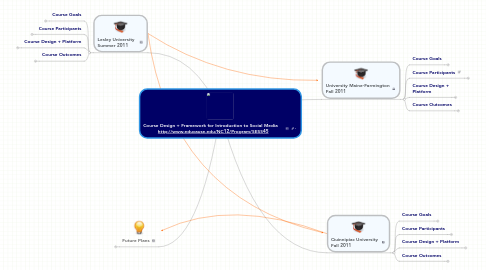
1. Lesley University Summer 2011
1.1. Course Goals
1.1.1. Provide a "virtual' teaching circle format: A space to explore and have conversations about social media and its role in teaching and learning.
1.1.2. Use a social media platform to provide context and experience of how social media can be used professionally and socially
1.1.3. Give clarity to the evolving landscape of "What is Social Media"
1.1.4. Develop an awareness of the creation of online identity in personal and professional practice
1.2. Course Participants
1.2.1. 13 total enrollments (view linked graph)
1.2.1.1. Poll of participant use of social media pre-course
1.3. Course Design + Platform
1.3.1. Edmodo selected for its Facebook-like look and feel and conversational format. (Free to .edu)
1.3.1.1. Video: Edmodo Overview: http://youtu.be/4-KBwriCO-Q
1.3.2. One facilitator (Rebecca Petersen)
1.3.3. Completely online, 3 week course. No synchronous face-to-face or webinar sessions.
1.3.4. Curriculum & content consisted of existing video, articles, and blog posts that would stimulate discussion.
1.3.4.1. Content Examples
1.3.4.1.1. Social Media Revolution Video http://youtu.be/0eUeL3n7fDs
1.3.4.1.2. Is Social Media Ruining Our Students? http://bit.ly/wvJBUv
1.3.4.1.3. Building a School Community Online: http://mashable.com/2011/04/26/facebook-for-schools/
1.3.4.1.4. How Cognitive Surplus Will Change The World (Clay Shirky) http://www.ted.com/talks/view/lang/en//id/896
1.3.4.1.5. What are Personal Learning Networks? http://youtu.be/q6WVEFE-oZA
1.3.5. Small bits of content posted daily or every other day. Participants also posted articles and resources for comments. http://bit.ly/yJQdEB
1.4. Course Outcomes
1.4.1. Participants satisfied. Expressed interest in focused workshop on specific tools/sites http://bit.ly/y7XCJv
1.4.1.1. Open-ended comments + feedback:http://bit.ly/ypUGfC
1.4.1.2. Participation numbers may also reflect faculty familiarity with online workshops and professional development
1.4.2. Led to the development of UMF and QU Online Courses
2. Future Plans
2.1. Wentworth Institute of Technology Spring 2012
2.1.1. Planned collaboration with Humanities Department
2.1.1.1. Sharing Resources from Lesley Coures via Private Digital Humanities Departmental WordPress Site
2.1.1.2. Developing Face-to-Face workshop to complement upcoming NITLE collaboration
2.1.2. Collaboration with Web Services Group
2.1.2.1. Face-to-Face event about online identity in conjunction with Web Content Month (April)
2.2. Social Media Policy Group at UMF
2.3. Mandatory Training for Internal QU Online Staff
3. University Maine-Farmington Fall 2011
3.1. Course Goals
3.1.1. Adapted from Lesley Course
3.2. Course Participants
3.2.1. Based in Blackboard (9.1) Four week duration 19 faculty from across the disciplines & 3 non-faculty participants
3.3. Course Design + Platform
3.3.1. Utilized Bb LMS (Version 9.1)
3.3.2. Content Followed A Weekly Modules Format
3.3.2.1. Content Adapted From Lesley Course
3.3.3. Planned as a 4 week, completely online course, no synchronous sessions
3.3.4. One facilitator (Rebecca Petersen)
3.4. Course Outcomes
3.4.1. Participants interested, but overwhelemed by the formality of online format and volume of content. Course post-poned at the beginning of the 3rd week for low-participation.
3.4.1.1. Factor 1: Online Professional Development new to UMF community
3.4.1.2. Factor 2: Participants more interested in general overview and not a full, 4 week course
3.4.1.3. Factor 3: LMS created a more formal environment than the Edmodo site.
3.4.2. New series will include synchronous elements in Adobe Connect or Google+ hangout.
3.4.3. Social Media policy group- grassroots (supporting the residential student)
3.4.4. Meeting students where they are at- Facebook group (share resources, connect w/experts, practitioners, previous students, etc.)
4. Quinnipiac University Fall 2011
4.1. Course Goals
4.1.1. Engage in a conversation exploring the strengths and challenges of social media and how it impacts our work and teaching
4.1.2. Experience how learning can happen in a social media platform
4.1.3. Understand how to manage interactions within social media for the achievement of individual and common goals
4.1.4. Provide a fun and non-threatening environment to experiment using social media tools
4.2. Course Participants
4.2.1. 11 Faculty & 9 Staff
4.3. Course Design + Platform
4.3.1. Fully online, asynchronous Delivered in Ning over 4 weeks Cost $25.00 per month
4.3.1.1. Learn More About Ning http://www.ning.com/about/product/
4.3.2. 3 Moderators
4.3.2.1. Instructional Designer
4.3.2.2. Rebecca Petersen
4.3.2.3. Linda Chicoine, Biology Professor
4.3.3. 4 Modules of Content
4.3.3.1. Week One: Introduction to Social Media
4.3.3.1.1. How Social Media Can Make History (Clay Shirky) http://www.ted.com/talks/clay_shirky_how_cellphones_twitter_facebook_can_make_history.html
4.3.3.1.2. Jenica Rodgers' Speakers Notes on Online Identity http://www.attemptingelegance.com/?p=652
4.3.3.2. Week Two: The What and How of Social Media: Facebook
4.3.3.2.1. Facebook versus the United States (infographic) http://mashable.com/2010/04/05/facebook-us-infographic/
4.3.3.2.2. How Colleges Use, Misuse Social Media http://www.cnn.com/2011/10/20/tech/social-media/universities-social-media/index.html
4.3.3.3. Week Three: The What and How of Social Media: Twitter
4.3.3.3.1. Twitter In Plain English http://www.youtube.com/watch?v=ddO9idmax0o
4.3.3.3.2. Twitter 101: The Basics of Entering the Twittersphere http://www.digitalpedagog.org/?p=1287
4.3.3.4. Week Four: Teaching & Learning with Social Media
4.3.3.4.1. The Twitter Experiment: Twitter in the Classroom http://www.youtube.com/watch?feature=player_embedded&v=6WPVWDkF7U8
4.3.3.4.2. Top 100 Social Media Colleges http://www.studentadvisor.com/top-100-social-media-colleges
4.3.4. Every few days, new content was posted in the form of short videos, articles, infographics, etc.
4.4. Course Outcomes
4.4.1. While participation was low, interesting conversations were happening outside of the workshop site
4.4.2. Continued interest in exploring social media

